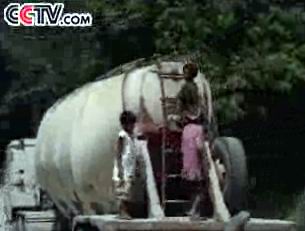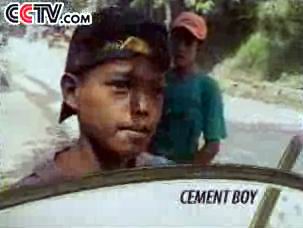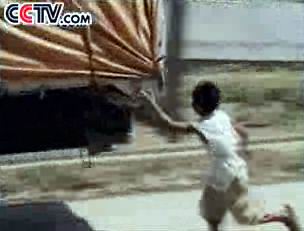Source: CCTV.com
01-12-2007 15:20
When children drop out of school, it is not necessarily because of irresponsible parenting; in extreme circumstances, it's due to their families' financial situations. When these children leave school, they become potential workers.
Deprived of simple childhood joys, they're relegated instead to a life of drudgery. In the Philippines, some children live on the leftover cement of passing trucks.
In today's working Asia series, NET 25 Philippines' Penny Choco and Reihn Flores expose the dangers of the job and the children who do it.
 |
While some children make their way home from school under the heat of the mid day sun, these young boys hang around a small roadside store, casually waiting – as if in ambush – for someone...or something...
Their target: Cement tankers on their way back to a nearby cement manufacturing plant in a small locality in Antipolo, Rizal. The trucks have finished delivering their load of cement, but they are not quite empty. The boys wait for the trucks, and for the contents that lay inside.
Q-Interviewer
A-Cement boy A
Q: What do you do in the trucks?
A: We scoop up the cement
Q: And then?
A: We put them in sacks
Q: And then?
A: We sell them
Q: To whom do you sell the cement?
A: We sell it there
 |
Q-Interviewer
A-Cement boy B
Q: Then, why do you climb the trucks? (Why are you working?)
A: Because we do not want to just hang around doing nothing. And we do not want to steal.
These young boys, mostly small for their ages of 11 to 15 years, take advantage of their youthful agility and small bodies to easily jump onto the trucks and enter the tankers. Scraping off the remaining cement from the tanks' walls, they gather these in sacks to sell.
The boys work day or night...Sometimes even spending the night by the roadside.
Those parents are glad that their children are able to help them. Especially those parents who are lazy...They have to buy cigarettes. For buying liquor. But they don't have any money left for their viand and rice. And so the children are forced to work.
Q-Interviewer
A-Cement boy C
Q: How about school?
A: None
Q: Do you still go to school?
A: Not anymore
The young boys are taken on making money that would help them get by everyday. But working hard for everyday survival is depriving them of opportunities for a better future that could be more possible if they get an education.
So what does the future hold for these boys? What if in the course of pursuing trucks they get maimed, or worse, killed?
 |
Without an education to prepare them for the future, what would become of them when their bodies no longer allow them the agility to slide into the tankers? What if their frail, unhealthy bodies succumb to disease brought about by exposure to the trucks’exhaust fumes and minute cement particles?
It is not the responsibility of the child to work for their families at a young age. Especially in the dangerous line of work. The parents should strive hard so that children will strive as well in their studies. If the children were able to attain education, they will have a better future. They will have better job opportunities not the hazardous ones...
Maybe someday there might be hope for these boys. But until then, they stay by the roadside, taking life easy in the same manner as other children their age do - hanging around, dancing, teasing each other – but only different in that their future could be as dry and dust-laden as their young bodies are.
East Timor remains the poorest country in southeast Asia, nearly four years after independence. And the street children have had an especially difficult life there. Tune in tomorrow for our story on Street Children and Education in East Timor.
Editor:Du Xiaodan
